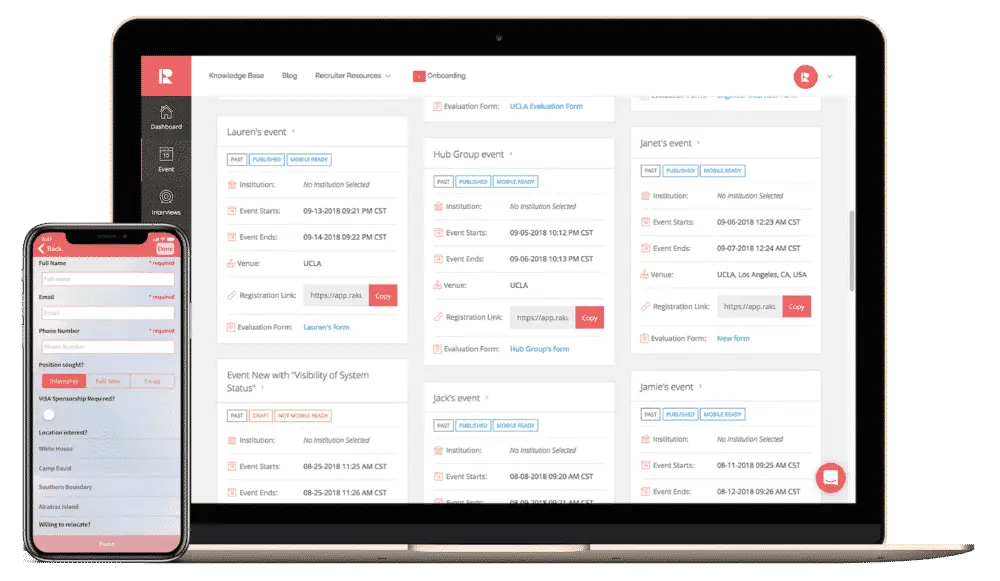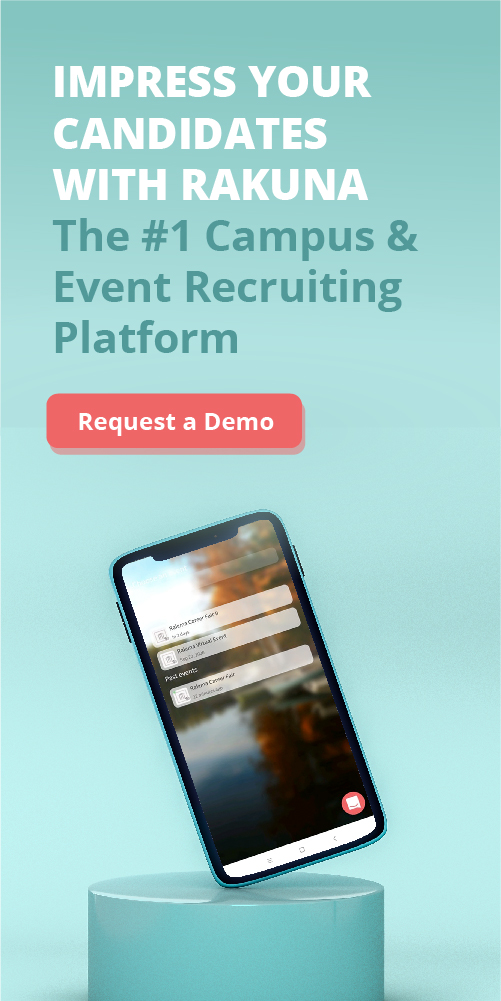/blog/7-best-practice-strategies-for-virtual-campus-recruiting-1/-08-02-2022
Navigating the talent war requires strategic use of technology to outshine competitors and excel in virtual campus hiring. To gain a competitive edge and simplify the hiring process, we’ve curated the top 7 tactics for your consideration.
What Is Campus Recruitment?

For new recruiting teams, here’s a quick recap on the Whats and Whys of campus recruiting:
Campus recruitment is the strategic process through which companies engage with educational institutions to attract, screen, and hire talented individuals for various positions, including internships, co-op programs, and entry-level roles. It serves as a vital avenue for organizations seeking to bolster their workforce with fresh talent straight from academic institutions.
In essence, campus recruitment serves as a crucial strategy for sourcing and engaging with young talent, particularly for internship and entry-level positions. While it’s commonly associated with medium to large-sized enterprises with substantial hiring needs, its scope can vary, ranging from collaborative efforts with university career centers to extensive operations involving visits to multiple campuses and attendance at recruiting events.
Key Components of Campus Recruitment
Recruiting teams typically kickstart the process by targeting specific schools or campuses and initiating pre-event activities to capture the interest of potential candidates. These activities pave the way for comprehensive screening, interviewing, and eventual hiring of suitable candidates.
Industry Dynamics
Various industries actively participate in campus recruitment, with sectors such as finance, technology, business consulting, manufacturing, and engineering leading the charge. These industries recognize the value of tapping into the vibrant pool of talent available within academic institutions.
As companies navigate the landscape of campus recruitment, collaboration with university career services centers and participation in career fairs emerge as pivotal strategies. These avenues provide direct interaction opportunities with college students and recent graduates, fostering meaningful connections that can lead to successful hires.
If you are entirely new to the concept, check out our Campus Recruitment 101 blog for a head start.
Why Do Companies Conduct Campus Recruiting?
In the past years, campus recruitment has been a large part of every company’s recruitment efforts. But why do employers need to conduct campus recruitment?
Below are some reasons why:
To Create a Talent Pipeline

For companies to succeed in the tight labor market, they have to take a proactive approach to manage their current and future hiring needs. A campus recruitment program is essential to screen candidates for available positions and mark potential talent for future job openings.
To Find Enthusiastic Workers

Many employers today require their employees to have experience. A graduate survey done in the Middle East and North Africa states that 76% of the respondents claim that finding their first job is challenging, while 31% said it is very difficult. The same survey revealed that 51% of respondents believe employers are hesitant to hire fresh graduates due to a lack of experience.
While many companies prefer applicants with experience, hiring fresh graduates can give your organization an edge in digitalization. These fresh graduates have an intense thirst for knowledge and are highly determined to prove themselves in the real world. Millennials and Gen-Z can quickly adapt to the latest technologies, growing up in the digital world.
To Bring New Knowledge and Skills

College people or fresh graduates can bring new perspectives and various ways to deal with company issues. They may not be experienced with the company’s processes, but they can hone in on creative plans old employees won’t be able to come up with.
The younger generation is more in tune with current events. They are more aware of modern trends and how consumers will react. Using their innate knowledge and fresh ideas to implement into the company’s processes, they’ll craft solutions to elevate its culture and better connect with consumers.
Before the pandemic strike, campus recruitment was done in an educational institution’s physical location to find and engage promising students completing their studies.
With the danger of the pandemic still affecting many aspects of life, both employers and employees cannot afford to wait for physical sites to come back but must move the talent acquisition process partially and in many cases, totally online and virtually.
Challenges of a Virtual Campus Recruitment Landscape
As companies worldwide start adopting virtual campus recruitment, we begin to discover various challenges associated with this form of recruitment. Acquiring leads virtually, creating an optimized candidate experience, and screening for suitable candidates are some of the concerns recruiters have when conducting virtual campus recruitment. However, overcoming these challenges can bring sweet rewards that the traditional recruiting process can never reap.
Read on to learn some of the successful strategies to transform your virtual campus recruiting strategy!
Campus Recruitment Goes Remote
Virtual campus recruitment should become an essential business strategy. Even if the pandemic ends, this campus recruiting trend will continue to open up more opportunities and save costs for both applicants and companies.
To access the top talent and improve your talent acquisitions, we’ve compiled the best eye-opening strategies for virtual campus recruiting.
1. Enjoy the New Flexibility to Broaden Your University Talent Pool

With virtual campus recruitment, you can include more schools and universities in your talent acquisition process to expand your horizon. Your recruitment efforts are no longer limited to just a few specific schools and physical events to find talent and build a socio-economically and racially diverse pipeline.
- Your company can assign recruiters to different channels on the internet, such as social media platforms, websites, and more.
- It’s also best to add schools you previously didn’t include in your campus recruitment to widen your pool. Remember that you are not looking for schools. Instead, you’re looking for talented individuals to be assigned to specific jobs.
- If it’s your first time conducting virtual campus recruitment at a specific school, make sure to reach out to the school’s career development centers. Form good relationships with the school and their careers team. This is because the department can lead you to their best graduate students; they are dedicated to helping them transition to work.
- According to Gartner, if your company plans to host a virtual event, you can save up to 70% of the cost of attending a physical career fair. With online recruitment, you can save some of these offline recruitment expenses associated with traveling to the campus location, setting up your booth, and paying fees.
2. Clearly Communicate Your Company’s Value Proposition to Students

When transitioning to virtual campus recruiting, it’s crucial to create an engaging landing page that effectively communicates your company’s values and mission to potential candidates. According to a Gen Z Spotlight Report by the Carson College of Business, 68% of Gen Z candidates are concerned about their career growth potential, and 70% want to work for a company that aligns with their values.
To appeal to this generation, ensure that your campus recruiting landing page highlights:
- Company Mission, Vision, and Values: Clearly articulate your company’s core beliefs and principles.
- Support for Employees: Showcase how your company supports its workers.
- Community Engagement: Highlight involvement in community and social causes.
- Diversity and Inclusion: Emphasize your commitment to diversity and inclusivity.
Authenticity is key when presenting this information. Gen Z candidates value transparency and can easily detect over-selling. Be genuine in your messaging to establish trust and credibility.
Tips for Engaging Gen Z Candidates

Effective communication is essential for successful virtual recruiting events. Consider the following tips:
- Be Transparent: Provide honest and open information about the job and your company.
- Respectful Communication: Interact with candidates in a respectful and considerate manner.
- Build Relationships: Start building positive relationships with potential employees during the recruitment process.
- Encourage Dialogue: Encourage candidates to ask questions and actively participate in discussions.
Additionally, leverage social media platforms to engage with candidates and showcase your company culture and values. However, ensure your content is relevant and engaging and avoids overwhelming candidates with unnecessary details.
Utilize relevant hashtags to increase visibility and direct candidates to your company’s blog posts and videos for more information. Encourage employees to share authentic insights about your company culture without pressure to oversell.
By effectively communicating your company’s value proposition and engaging with Gen Z candidates, you can attract top talent and build a strong pipeline for future hires.
3. Embrace User-Friendly Campus Recruiting Software

View of Rakuna’s Campus & Event Recruiting Solutions
Intuitive mobile app and powerful Analytic Dashboard
Transitioning to virtual campus recruiting requires robust technology solutions to streamline your hiring process and adapt to changing landscapes. Finding the right campus recruiting software enhances productivity and attracts top talent.
Why Invest in Campus Recruiting Technology?
- Appeal to Tech-Savvy Candidates: Gen Z and Millennials are tech-savvy generations. Investing in intuitive campus recruiting software demonstrates your company’s commitment to innovation and modernity.
- Adaptability to Virtual Settings: Your recruiting software should seamlessly support both physical and virtual recruitment events. This flexibility ensures continuity in data management and candidate engagement, even during uncertain times like the COVID-19 pandemic.
How Rakuna Can Help
Rakuna offers comprehensive campus and event recruiting solutions designed to streamline your recruitment process:
- Mobile Apps with Resume Parsing: Rakuna’s mobile apps facilitate easy data collection and management, allowing recruiters to capture candidate information effortlessly.
- Hybrid Recruiting Support: Whether you’re conducting in-person events or virtual career fairs, Rakuna’s tools ensure seamless recruitment operations, adapting to your evolving needs.
- Effortless Data Management: With Rakuna, manual data entry becomes a thing of the past. The platform automates tedious tasks like scheduling interviews and tracking candidate interactions, saving time and minimizing errors.
But Why Are These Tools Essential?
Efficient data management is crucial for successful campus recruiting. Rakuna’s user-friendly interface and mobile accessibility ensure that candidate information is securely stored and easily accessible. By digitizing resume data and eliminating paper-based processes, you improve efficiency and contribute to environmental sustainability.
Investing in user-friendly campus recruiting software like Rakuna empowers your team to efficiently manage candidate data, adapt to virtual recruitment environments, and attract top talent to your organization.
4. Enable Psychometric Assessment
When hiring virtually, accessing necessary insights and details on every applicant will help companies identify and shortlist the right talent. Most companies offer technical assessments to identify talent for technical roles.

However, the applicant’s personality and competency should also be included in every employer’s assessment. So, when doing virtual campus recruitment, explore possible ways to conduct psychometric assessments to get a holistic view of the applicants.
What are psychometric assessments? These tests scout the candidates’ suitability to the company by measuring their intelligence, behaviors, and values.
You can use an already existing personality evaluation test like the DISC (Dominance, Influence, Steadiness, Conscientiousness) assessment. It’s also free and available online.
If you want a more in-depth assessment, you can look for other tests provided online. You can even create your own to see if a candidate matches your organization the best.
5. Create a Dedicated Graduate Career Page
\ Since physical campus visits may not be possible, offering graduates a glimpse into your company’s work environment and culture is crucial. Ensure your career page prominently features a list of graduate openings, eliminating any uncertainty for applicants regarding available positions. Enhance your career page with engaging videos providing insights into your company’s culture, making it relatable and enticing for potential candidates.
Looking to create dynamic career sites? With Rakuna’s recruitment and employer branding ATS, building landing pages becomes as easy and enjoyable as playing with LEGO bricks. Simply customize and drag-and-drop content cubes to craft a page that reflects your vision.
You can even create a virtual job or career fair on your website to let your candidates know more about the job openings and your company. Simultaneously, you’ll be able to broaden your talent pool.
These career fairs will even let you conduct Q&A sessions and speed interviews. They can even be university-specific if you want to comb through each college.
6. Pre-Screen with Video Interviews

\ Hiring recent graduates involves assessing more than just their skills and resumes. Their personalities also play a crucial role in the hiring process. However, quickly and effectively screening many students can be challenging.
Pre-recorded video interviews solve this challenge by saving employers hours of screening time. They also allow employers to pose custom questions for students to answer.
Here are some insights that video interviews can provide, even in pre-recorded format:
- Candidates who accurately convey information about the company demonstrate their investment in understanding your organization. This commitment to answering interview questions reflects their potential dedication as employees.
- Familiarity with your company’s values and goals is evident when candidates passionately respond to your questions, showcasing their interest in joining your team.
- Beyond verbal responses, video interviews allow observation of candidates’ body language, revealing their intentions, emotions, and personalities.
When watching video interviews, pay attention to the following body language cues:
- Appearance: Candidates who dress appropriately and maintain a well-groomed appearance demonstrate preparation and professionalism.
- First Impressions: Initial impressions, formed within seconds, provide insight into the interview’s tone and direction.
- Eye Contact: Direct eye contact indicates confidence and engagement, while avoiding eye contact may signal uncertainty.
- Posture: Candidates should sit upright, as posture influences voice and can reveal tension or relaxation.
- Closing Remarks: Candidates’ farewell should be courteous and composed, reflecting their professionalism until the end of the video.
Assess candidates’ responses to interview questions to gauge their expertise and knowledge, focusing on their career goals and educational background as recent graduates.
Customize interview questions to gain specific insights into candidates’ suitability for the role, streamlining the talent acquisition process for faster and more efficient hiring.
7. Do Online Live Interviews for Face-to-Face Rounds

Switching to online live interviews for face-to-face rounds offers several benefits for employers and candidates. This approach allows companies to effectively evaluate shortlisted candidates more dynamically, providing valuable insights into their communication skills and professionalism.
By transitioning from pre-recorded video interviews to live interactions, employers can assess candidates’ ability to articulate themselves confidently and engage in real-time conversations. This direct interaction helps recruiters gauge candidates’ personalities and suitability for the role more accurately.
Moreover, live online interviews streamline the interview process by eliminating the need to schedule and coordinate in-person meetings. Candidates no longer have to contend with travel logistics or time constraints, making the process more convenient and accessible for all parties involved.
Traditional interview methods often entail lengthy scheduling processes and logistical challenges, which can deter potential candidates and result in missed opportunities for both parties. By embracing online live interviews, employers can overcome these barriers and ensure that they don’t overlook qualified candidates due to logistical constraints.
Now that we have gone through 7 core effective practices for virtual campus recruiting, consider checking out the National Association of Colleges and Employers’ report on what was working and what was not for this new form of recruitment in 2021:
Additional Strategies for Successful Virtual Campus Recruitment
In addition to the strategies we’ve already covered, here are a few more tips to enhance your virtual campus recruiting process:
- Prioritize Quality Over Quantity
While virtual recruiting offers a broader reach, remember that the goal isn’t just to gather as many candidates as possible. Focus on quality over quantity by investing resources in channels that attract top-notch talent. Quality recruits will ultimately contribute more to your organization.
- Assign Key Personnel
Virtual recruiting requires dedicated individuals to oversee the process effectively. No matter how many tasks are being automated in your recruitment process, key personnel should always be present to ensure a smooth candidate recruitment experience by providing timely responses and guidance.
In a research survey conducted by The Kronos Research Institute with 3400 Gen Z individuals, 44% revealed that slow responses from recruiters and hiring managers turned them away from a position.
Slow communication can deter potential hires, so having the right people in charge is crucial.
- Begin Early
Start engaging with potential candidates early, especially if you target graduate students. Early outreach gives you a competitive edge and allows you to build relationships with prospective hires before they explore other options. Partnering with educational institutions and leveraging referrals can also boost your recruitment efforts.
- Utilize Data Insights
Collect and analyze data from your virtual recruitment efforts to inform future strategies. By tracking metrics such as candidate engagement and conversion rates, you can identify areas for improvement and refine your approach over time. Keep abreast of current research and adapt your processes to align with evolving candidate preferences for continued success.
Implementing these additional strategies alongside existing best practices will help optimize your virtual campus recruitment efforts and attract top talent effectively.
To Conclude
Companies must adjust and adopt modern ways to recruit talent. Virtual recruitment will not only give your organization an edge over the others, but it will also open up many opportunities that will help you save on costs and work more effectively.
After learning the seven effective strategies for virtual campus recruitment, you’re now ready to search for the best candidates and give them the best recruiting experience.


